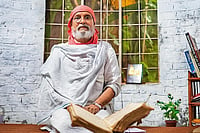Apollo Hospitals and Reckitt launched the Arogya Rakshak initiative, which focuses on hygiene in schools, health and nutrition centres. Konidela, the alumnus of Regent’s University, London, is enthusiastic about the initiative’s achivements. In an interview with Naina Gautam, she says that schoolchildren have emerged as hygiene influencers. Edited excerpts:
What is your role as WWF India’s ambassador?
In one word, it means courage: It takes courage to be an ambassador for heroic foot soldiers of conservation. I’m deeply humbled to stand for their needs, tell their fascinating stories, and learn how we as humans can strike a healthy balance between the planet and us.
The key is in partnerships with people employed with the forest department, nature enthusiasts, forest trackers, tribes, and those who live around the forests. Reducing human-wildlife conflict is our core goal. We need to learn to respect our boundaries. Apollo Foundation is happy to manage health of forest frontline heroes through free treatment at Apollo Hospital. We run preventive health camps in vulnerable regions to improve health.
What are the achievements of Arogya Rakshak initiative?
The main achievement is the creation of a large band of school children at the village level, who have become hygiene influencers. Handwashing and hygiene practices form part of core communication. Menstrual hygiene education is given through a play-way method so children don’t feel shy or burdened. We set up India’s first Hygiene Play Park. Our impact involves the improvement of health and hygiene among children in 500 schools, and new mothers in Chittoor district.
How does Arogya Rakshak complement Total Health initiative?
The CSR initiative is a model that promotes health equity in rural India from a holistic and integrated lens. It stands on the pillars of health (including care delivered at various levels, nutrition, and WASH), livelihoods (financial wellness), and community engagement. It focuses on early detection and prevention of diseases.
A recent report says India lacks data on WASH services in hospitals. What is your experience?
WASH is among the major determinants of health status. Apollo monitors a range of measures that cover aspects of WASH, and reports them in Sustainability and ESG Report. Measures such as hospital infection management, water quality monitoring, and clinical outcomes are relevant to the larger framework. These are tracked and monitored in our facilities. The percentage compliance to International Patient Safety Goals is 100%. The national landscape is varied, though many public and private hospitals report good data compliance. But this remains work in progress.
What is the reason behind the lack of hand hygiene compliance?
It can be attributed to varied reasons. Some facilities lack resources or infrastructure, and the staff does not have access to reliable water supply, soap or alcohol-based hand sanitiser. Lack of awareness tends to persist amongst healthcare workers. Perceived barriers like insufficient time or high patient-to-nurse ratios contribute to lower compliance. A behaviour change is crucial.
As the largest hospital network in India, with 10,000+ beds and 12,800+ doctors, we have strict measures to ensure compliance. The first step is to bring stakeholders on board through workshops and aggressive awareness drives. The second is monitoring and evaluation. Training activities are conducted online through Apollo Medskills and Medvarsity to ensure that professionals can access protocols.
Are national guidelines for healthcare facilities good?
These are comprehensive. However, challenges lie in implementation. At Apollo, we have a robust infection control programme with 95-100% compliance with International Patient Safety Goals. These include: committee for each hospital to review data regularly; a programme supported by information management; periodic audits; orientation and teaching/training programmes; augment antimicrobial stewardship programme; staff vaccination; appropriate patient placement and precautions; careening of food handlers; usage and care of intravascular and invasive devices; care of equipment, linen disinfection, air conditioning for operating rooms and ICUs; Lab Safety Program and Waste Management Policy; environmental monitoring; monitoring of disinfection and sterilisation processes; annual mock drills and; tracking control parameters through online dashboard, which are benchmarked and thoroughly analysed.
How can behaviour change be sustained?
It is a long-term endeavour. Regular communication is the key, with constant reiteration of messages. For instance, we don’t talk about handwashing being important, or even why it’s important. We talk about the six steps to handwashing so the message is clear. Behaviour change can be sustained if it’s put into practice regularly, and reviewed constantly. It takes a minimum 21 days to make or break a habit.
What is Apollo’s approach in this area?
Apollo Foundation works across age groups and rural segments. At the school level, Arogya Rakshak has a health-plus-hygiene focus. At the community level, we monitor non-communicable diseases (NCDs), especially diabetes, and classify people as high-, moderate- and low-risk. While medication forms part of the prescription, we build advice into it. When we set up Total Health in 2013, we realised that rural diabetes levels were rising, though at a slower rate than in urban setting. We initiated community yoga sessions to bring healthy movement back in their sedentary lives. Another way of making sure that the rates of diabetes don’t spiral is to keep people, especially youth, engaged in sports and games. We have thrown open our six-acre campus for outsiders to play cricket, football, and badminton, or walk around the field.
How important is handwashing?
One of Covid’s crucial protocols was to wash hands. If we follow this, we will be safer and less vulnerable. We have launched a volunteering programme in Chittoor district and Amrabad Tiger Reserve in Telangana. We invite people to be involved in our work by giving time, talent, or treasure. This is another way to engage with communities.
Upasana Kamineni Konidela, Vice Chairperson, CSR, Apollo Hospitals


























